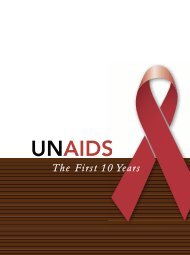Task Shifting - Global Recommendations and Guidelines - unaids
Task Shifting - Global Recommendations and Guidelines - unaids
Task Shifting - Global Recommendations and Guidelines - unaids
Create successful ePaper yourself
Turn your PDF publications into a flip-book with our unique Google optimized e-Paper software.
<strong>Recommendations</strong> on the organization of clinical care services<br />
dispensing of drugs prescribed by a qualified provider; <strong>and</strong> tasks related to the prevention of<br />
mother-to-child transmission. Community health workers are also trained to work in supportive<br />
services for HIV care, including as X-ray technicians, laboratory assistants, pharmacy assistants<br />
<strong>and</strong> data clerks.<br />
The study findings include data to support the position that task shifting that involves community<br />
health workers as part of a team for the delivery of HIV services is both safe <strong>and</strong> effective. The<br />
involvement of community health workers also facilitates the provision of a number of services,<br />
such as adherence <strong>and</strong> psychosocial support, that are not feasible using a clinic-based<br />
approach alone.<br />
Furthermore, people living with HIV reported a high level of satisfaction with the health care they<br />
were receiving from community health workers. In a survey of 200 people living with HIV, the great<br />
majority were satisfied or extremely satisfied with their assigned community health worker.<br />
The WHO-commissioned study on task-shifting also included focus groups <strong>and</strong> qualitative<br />
interviews with over 400 community health workers in Haiti to attempt to underst<strong>and</strong> their<br />
attitudes, expectations <strong>and</strong> underst<strong>and</strong>ing of their role in the health care in their communities.<br />
Similar research was conducted in Ethiopia <strong>and</strong> Rw<strong>and</strong>a. Community health workers expressed a<br />
willingness to assume new <strong>and</strong> extended tasks <strong>and</strong> more specialist cadres, such as nurses <strong>and</strong><br />
doctors, generally supported the role of community health workers as integral to their own duties<br />
<strong>and</strong> recognized that the presence of community health workers allowed them to spend time on<br />
more complicated tasks.<br />
A consultation with people living with HIV/AIDS, undertaken as part of the WHO Commissioned<br />
Study on <strong>Task</strong> <strong>Shifting</strong>, concluded that people living with HIV/AIDS have an important role to play<br />
as trained community health workers. Drawing from their own personal experience, they can<br />
make a particularly important contribution to addressing issues such as disclosure, prevention,<br />
self-care, adherence <strong>and</strong> stigma <strong>and</strong> discrimination. People living with HIV/AIDS often show a<br />
preference for community health workers who are also living with HIV/AIDS.<br />
Advantages:<br />
• The deployment of community health workers further extends the rational redistribution of<br />
tasks.<br />
• Community health worker programmes make use of underutilized human resources.<br />
• Shorter, task-specific training for community health workers facilitates rapid recruitment <strong>and</strong><br />
deployment.<br />
• <strong>Task</strong> shifting involving community health workers can make a major contribution to the<br />
decentralization of HIV services to rural areas <strong>and</strong> so bring health services closer to people<br />
living with HIV/AIDS <strong>and</strong> other patients.<br />
• Community health workers can help exp<strong>and</strong> human resource for health both at the facility <strong>and</strong><br />
the community level for HIV services <strong>and</strong> other health-care services.<br />
• The inclusion of community health workers in health teams allows frequent service-user<br />
interaction at the community level, which improves adherence, patient follow-up <strong>and</strong><br />
psychosocial support.<br />
Uncertainties:<br />
• Essential support systems, including training, supervision <strong>and</strong> referral systems, may not be in<br />
place or functioning well enough.<br />
• Strong planning <strong>and</strong> monitoring is needed to ensure an efficient system as a wide variety of<br />
cadres <strong>and</strong> roles poses challenges for coordination.<br />
• The involvement of community health workers is unlikely to be sustainable without established<br />
remuneration mechanisms.<br />
47

















